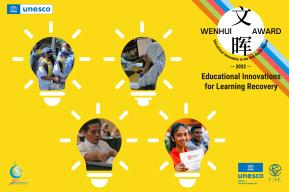News
UNESCO’s Global Education Coalition: Expanding online learning opportunities for Ukrainian learners and teachers

Earlier this year, Coursera, which has been providing online learning opportunities for Ukrainian students under the scope of the Global Education Coalition (GEC), announced it will extend its partnership with Ukraine’s Ministry of Education and Science (MESU). This prolongs the country’s higher education institutions and students to access Coursera for Campus.
Speaking of the initiative, Dmytro Zavgorodniy, Deputy Minister of Education and Science of Ukraine for issues of digital development, digital transformations and digitalization said it was helping to ensure continuation of education in these extremely challenging times. “It is access to knowledge and essential skills that our students and universities must keep. Every course can be someone’s changemaker,” he added.
Support learning continuity in Ukraine
Since 2022, the online course provider Coursera has worked closely with the MESU to allow students and faculty members across more than 280 Ukrainian universities and higher education institutions to access more than 5,800 courses and 3,500 guided projects. This includes projects from top universities and companies including the University of Pennsylvania, University of Michigan, Google, and IBM.
“As a member of UNESCO Global Education Coalition, we are honoured to continue partnering with the Ministry of Education and Science of Ukraine to ensure that Ukrainian students have access to quality education during these challenging times,” said Jeff Maggioncalda, Coursera CEO. “The remarkable progress made by Ukrainian learners is a testament to their resilience and determination to succeed.”
Some 50,000 Ukrainian learners benefitted already from the initiative, participating in more than 150,000 courses at no-cost.
"This partnership exemplifies what the Coalition seeks to do – innovate and mobilize resources to support the continuity of learning in the most challenging of times,” said Borhene Chakroun, Director of Policies and Lifelong Learning Systems Division at UNESCO. “And we are pleased that Coursera, as with many other members of the Coalition, will continue to support teachers and learners in Ukraine.”
Other contributions by Coalition members supporting the continuity of learning in Ukraine include supplying and distributing devices, training in mental health and psychosocial support, translating content into Ukrainian, and providing scholarships for students to continue their studies online.
Students improve their employability skills
Many of the courses that are part of this collaboration promote student employability by teaching in-demand skills for high-growth fields, such as English language communication, leadership and management, computer programming, and statistical programming.
This is helping learners such as Maksym Natalchuk, a graduate in information technology from Kyiv Polytechnic, who was left without a job when the Russian invasion started. Mr Natalchuk turned to online learning to gain skills for high-demand roles, studying up to 12 hours a day for four months and earning 16 professional certificates in the process.
“In March 2022, I signed up for Google's data analysis certification on the [online] platform and, since then, I’ve been learning online every day,” said Mr Natalchuk, who has since landed his dream job as a data analyst with an international consultancy firm.
The partnership also enables faculty members and instructors to create projects, assessments, and courses tailored to learner needs and connect them with supplemental learning.
Oleg Frolov is an academic who was teaching at Donetsk National Technical University before the institution was forced to relocate. He has since started teaching at Kharkiv National University of Economics and embraced online learning for both personal growth and teaching assistance, which he has found especially helpful in understanding complex topics.
"When I read a textbook on artificial intelligence, frankly speaking, I didn't understand much,” said Mr Frolov. “[But] on Coursera I found the same specialization, but it explained the concepts through videos, lectures, tasks and tests, which made it much easier for me to understand."
By using online platforms for learning and teaching, Mr Frolov believes he's helping his students, and himself, adapt and thrive amidst the challenging times.
For others, such as student Anastasia Kot, the opportunity to continue studying online has been a welcome distraction. A graduate from T.G. Shevchenko Chernihiv Collegium National University, she was forced to abandon her Masters and seek refuge in Poland along with her brother. In addition to gaining new qualifications, “[Learning online] helps distract me, gets me back into the flow of learning, and gives me strength,” Ms Kot said.







